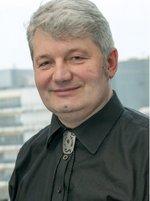
Dear Reader,
This Research Report, now the sixth of its kind by the University of Duisburg-Essen,
is dedicated to the research in our eleven faculties.
2012 proved to be a good year for the University in terms of obtaining research funding. At some 106 million euros compared with 97 million euros in 2011 (both including medicine), the increase in our external funding expenditure reflects the ongoing improvement in our University’s performance.
To name just a few of the year’s highlights, the Käte Hamburger Kolleg/Centre for Global Cooperation Research, initiated by Professor Tobias Debiel, INEF/UDE; Professor Claus Leggewie, KWI; and Professor Dirk Messner, DIE, Bonn, and approved by the Federal Ministry of Education and Research (BMBF) in 2010, got underway in 2012. At the beginning of the year, research work began on DFG Research Unit 1509 “Functional Materials at Multi Scales Continuum Modelling and Experimental Characterisation”, led by Professor Jörg Schröder. Scientists from Essen were similarly involved in successfully establishing Research Unit 1581 (“Extinction Learning: Neural Mechanisms, Behavioural Manifestations, and Clinical Implications”). Its speaker is Professor Onur Güntürkün from Ruhr University Bochum and its vice-speaker Professor Manfred Schedlowski. Another project, Priority Programme 1629 (“THYROID TRANS ACT – Translation of Thyroid Hormone Actions beyond Classical Concepts”), coordinated by Professor Dagmar Führer-Sakel, was also launched in the year.
After a construction time of just under one and a half years, the first scientists and researchers were able to move into the new NETZ building (Scientific Director Professor Christof Schulz; coordination Dr. Marion Franke) in November 2012. Since that time, the first research groups have already embarked on their work. 2012 also saw the successful evaluation of EffizienzCluster LogistikRuhr (with science and industry partners, UDE coordinator Professor Bernd Noche), which is now entering its second funding period as a result.
The UDE’s efforts to support junior academics and researchers were reflected in its successful participation in the “NRW.Forschungskooperationen” [NRW Research Cooperation] competition with its project “Leben im transformierten Sozialstaat (TransSoz): Zielgruppenspezifische Reformwirkungen und Alltagspraxen” [Life in the transformed social state (TransSoz): target-group-specific effects of reform and everyday practices]. The project is organised as a doctoral training group and ties in with the collaborative training group on “Widersprüche gesellschaftlicher Integration. Zur Transformation Sozialer Arbeit” [Contradictions of social integration. On the transformation of social work], which has been running since spring 2011 and is funded by the Hans-Böckler Foundation. Professors Ute Klammer and Fabian Kessl are leading the project on the UDE side, and its cooperation partners are the University of Applied Sciences in Düsseldorf and in Cologne.
It is ten years since our young University was formed, and much has happened in the intervening period. The reports from the faculties show how the University has grown together in this time and showcase the research highlights across its broad range of academic disciplines. The resulting Research Report presents a vivid picture of the diverse, fascinating and in so many ways excellent research ongoing at our University. Whether on an interdisciplinary or international level, the success is plain to see.
In the coming years, too, we will continue to concentrate our energies on building the future of our University in research and teaching. One thing is certain: Our faculties are the birthplace of outstanding ideas for the future.
I hope you find it both an interesting and informative read,
Yours, Prof. Dr.-Ing. Jörg Schröder

